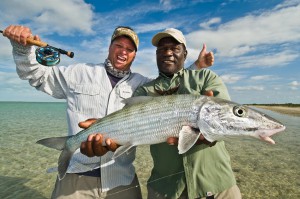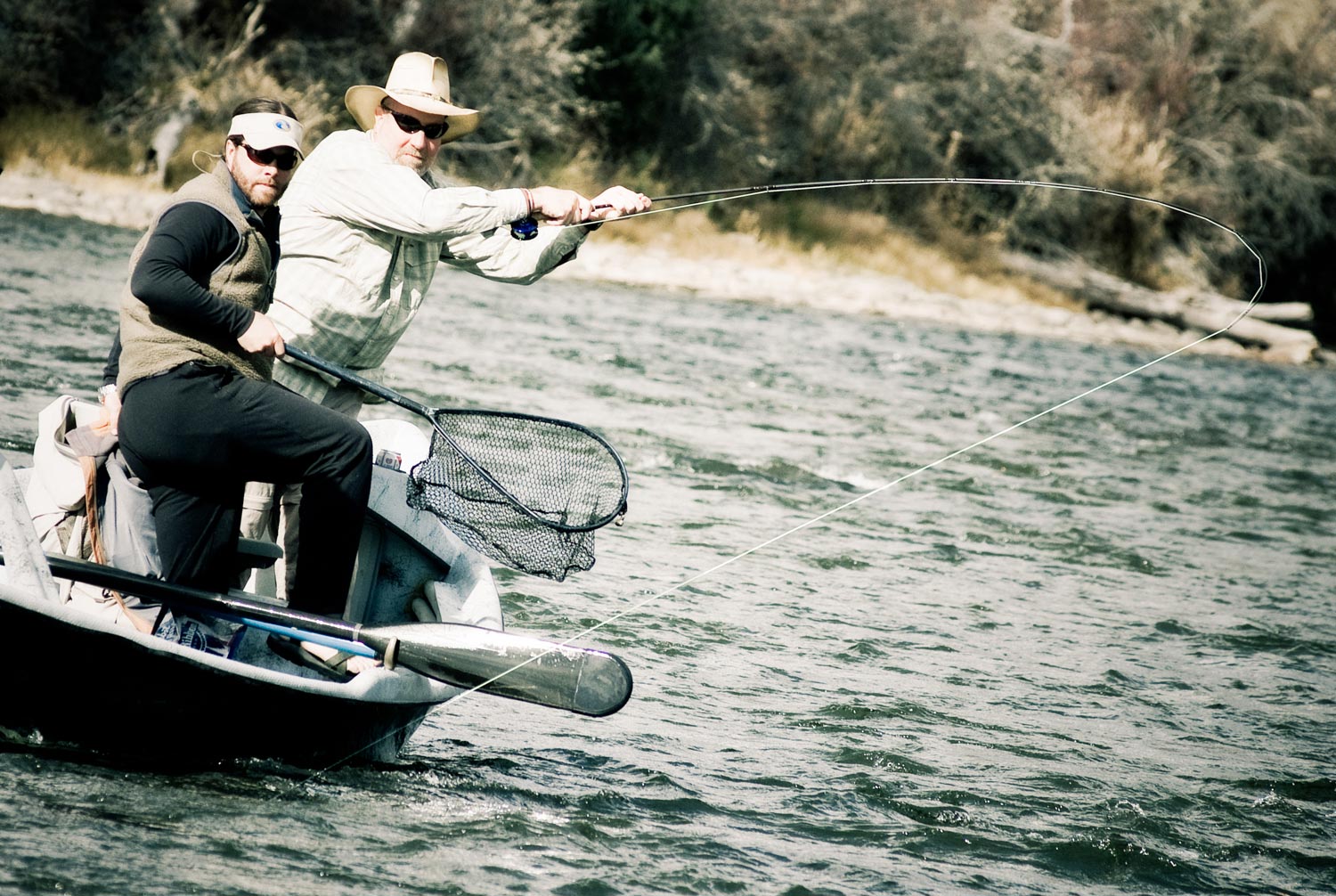By Louis Cahill
There’s not much better than the feeling you get when angler and fishing guide work together like a well oiled machine.
Regardless of which role you play in that relationship, it’s in your best interest to work together toward a common goal. Unfortunately that’s not always the way it works. Often the relationship is strained and stressful for both parties. If you have a regular guide you fish with, it’s probably not an issue, but getting to know a new guide, or client, can be tricky.
Since I do a lot of saltwater fly fishing, I do a lot of fishing with guides, both as a client and just swopping turns on the bow with a friend. I’ve had good and bad experiences and learned how to get along fishing with just about anybody.
I’ll try and share a few thoughts that might make your days on the water more productive and pleasant, whether your the angler or the guide.
Communication
Most human relationships boil down to communication. I mentioned working together to achieve a common goal. All too often flies hit the water with guide and angler having different goals in mind. It’s worth having a conversation about early on, and it should be a conversation. If the angler has a goal in mind that just isn’t realistic, a good guide will give them some perspective on the challenges. A good angler will listen to the guide and decide if they are willing to accept the risk of failure.
It’s important to be realistic about your needs. If you are an angler who needs to catch fish to be happy, don’t fight your guide when they try to put you on fish. If as a guide, you have an angler who is truly more interested in the challenge than the numbers, respect that. Never bullshit your guide about your skill level. They will find out soon enough exactly what kind of angler you are.
Respect
 The foundation of any good relationship is mutual respect. It has nothing to do with who’s a better caster or who’s paying who. It’s the kind of basic respect due any good person and it will make your day a whole lot better. A good guide never assumes his client is an idiot, even if the last hundred were and a good angler never judges his guide on his bank account. Always remember that a boat only has one captain and in the end, especially where safety is concerned, his word is final.
The foundation of any good relationship is mutual respect. It has nothing to do with who’s a better caster or who’s paying who. It’s the kind of basic respect due any good person and it will make your day a whole lot better. A good guide never assumes his client is an idiot, even if the last hundred were and a good angler never judges his guide on his bank account. Always remember that a boat only has one captain and in the end, especially where safety is concerned, his word is final.
Accept the level at which you’re operating
It’s important for the guide and angler to each understand their strengths and weaknesses. I’ll give you an example of what I mean.
I recently spent a very windy day on a flats boat with a guide I’d never fished with before. The first bonefish I had a shot at was at 3 O’clock, fifty feet out with a thirty plus MPH wind at my back. That’s a high percentage shot for me. I had that fish in my wheelhouse but before I could make the cast the guide started to turn the boat. He assumed I couldn’t make the backcast presentation and set me up for a forward cast with the wind off my right shoulder. I had to switch gears and use a Belgian cast. I got the fish but I struggled.
After I had the fish hooked I calmly told my guide that I had a strong backcast and in the future I’d prefer to make a shot like that with the wind at my back. The next time we set up on a fish in those conditions, things went smoothly.
What if you suck?
So you’re not a rockstar fly angler. A good guide doesn’t care. All guides know that they are teachers as well as guides. A good attitude and willingness to learn is more important than skill. As a guide, it’s a delicate matter to offer instruction to an angler who is struggling. If it’s not done with tact, feelings get hurt. The best way to diffuse this situation is to ask for help. It’s not a secret to anyone when your putting your fly in your ear every other cast, you might as well talk about it. Remember that the best way to learn is to have a sense of humor. The idea is to have a good time. In the grand scheme of things, catching fish isn’t that important.
Stick to these basic principals and you’ll have more pleasant and productive days on the water, whether you’re a client or a guide. If you’re interested in more ways things can go right, and wrong on a guided fishing trip, check out these two articles
Dos and Don’ts for Guided Fishing
Dos and Don’ts for Fishing Guides
Louis Cahill Gink & Gasoline www.ginkandgasoline.com hookups@ginkandgasoline.com Sign Up For Our Weekly Newsletter!
Sign Up For Our Weekly Newsletter!


This article brings to mind another aspect of being a good fisherman…you make the guide feel good. When you ask the guide to row over a bit and then put the fly in a coffee cup ring of the spot you asked for, when you drop a permit crab two feet in front of the fish at 70 feet (and you hear “great cast”), or when you just put the fly where you were directed and the fish takes immediately, there is just as much a reward for you as for your guide. Practice pays off for everyone
During the four hour driving leg today taking us from Tucson to three and a half months flyfishing out of West Yellowstone (sorry about that), I thought of another guide-friendly “thing to do.” Obviously not planable, but if you luck/work into something really noteworthy (a salt grand slam, a 25 pound steelhead among the usual 10-15 pounders, the “really big Keys permit or bonefish, etc.), don’t run around announcing your feat to anyone in sight….your guide at the lodge will let the cat out of the bag soon enough. There is just something pleasing about the lodge owner coming up to you at dinner and saying something like…”I just heard you did this or that today..I didn’t know…congratulations”…your guide will have had the fun of showing off his sport for the day. It happens.
I got into guiding when I discovered that I was having more fun turning other people on to catching fish than if I had caught the fish myself. You have to like and enjoy people to be a guide. And that’s just the beginning. It’s all about the guests. Every day is their “opening day.”
Sometimes the guide and you get off on the wrong foot and you have to swallow your unhappiness and hit the reset button. I wasn’t fishing badly one morning in the Bahamas, but I wasn’t making the precision casts required, either. About 11 a.m. the guide and I got into a shouting match over another missed opportunity. He then didn’t say a word the next half hour and I caught two fish in three casts, one of them an OTA cast between two mangrove shrubs that hit a good fish on the nose. I couldn’t have repeated cast if I tried ten more times, but not a word from the guide. I may have been steaming mad, but I was focused.
Then he said, “I’m having lunch” and we left the fish for a run to an island where he picked through his sandwich for 30 minutes while I stewed in silence. WTF? The fish were biting, I was casting like Prescott Smith and my guide pulled the plug because it was lunch time? Never had Cheetos tasted so bitter.
Even though I didn’t really feel I’d been in the wrong, I switched to Husband Mode and apologized. I suggested that after lunch was a fresh start, and I knew that he was a great guide (humph!) who worked really hard for his clients (hah!). I sold it hard, asked him to suggest a fly and tried to coax him back into the flow.
After lunch, my guide put on a show that had him poling into the wind, poling up tide in pursuit of pods, and running the boat like a circus clown on LSD to keep the sharks off my biggest bone to date. When I landed that fat boy and the lucky critter still had all his scales, we were both hooting and hollering like high schoolers at their first R-rated drive-in. On the way back to the lodge, I picked up a 20lb barracuda (which went home for dinner with the guide). Turned out to be the best day of the trip.
Other than “Don’t be a dick,” I guess the lesson is to understand that the guide has feelings that occasionally boil over. If that happens, rather than stay mad give the fellow some face and ask for a do-over.
* * * * *
Needless to say, at the end of the week when we fished together again we had a great day on the water.
I tell the guides up front to help me correct my casting stroke and not to worry about hurting my feelings since I want to learn. I also tell them I don’t expect to catch any fish and I want to enjoy the moment. Catching is a bonus.
I’ve been casting poorly for thirty years so changes take time and concentration and big fish are too distracting to focus!
One of the first times I fished, I went with a guide. I admitted up front that I was a rookie, and that I wanted to learn. Learned a little, caught some fish and had a good day. Went back the following year and, well in advance of going, requested this same guide. Got up early and was excited…obviously the guide wasn’t: he was late, in a pissy frame of mind, and the day was a train wreck. Soured me on guides for a while…
I absolutely love the commenter who mentioned making the guide feel good. How true that is! It is definitely beneficial to take your guide’s advice, and “even if you suck” each guide knows he is there to teach and he isn’t expecting professionals.